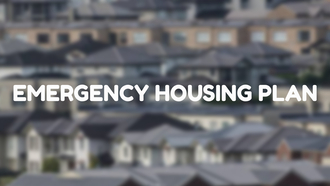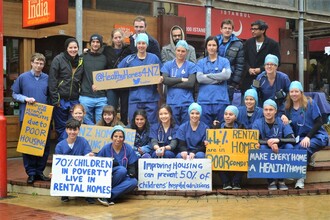100% Housing
Find a campaign
Campaigns (4)
-
PoriruaProtect Porirua East!The proposed rules in the District Plan would enable a huge 25 year housing development programme in eastern Porirua. The project will mean over 1000 state homes knocked down, families displaced and private property acquired under the Public Works Act to free up land for property developers. The plan will see an additional 2000 houses for private sale crammed into the geographically small suburbs of Waitangirua and Cannons Creek. The main theme of the proposed district plan is to allow greater housing density, which is needed, but currently it does so in a way that discriminates on social class. Under the proposed plan the generally middle class suburbs become the low density General Residential Zone and the generally working - class suburbs become the medium density residential zone. This means reduced amenities for the east only! The plan in it's current state doesn't go far enough to tackle climate change. Porirua has an empty city centre that has space for apartment style housing that is walking distance to public transport and amenities. This space should be utilised before digging into our green belt. With over 1000 houses set to be demolished in the East we need to ensure that waste is managed and minimised, and the new builds bring an opportunity to used renewable energy sources. We need a Porirua that all people can get around and the community can live in. Our current housing stock doesn't meet the needs of our disabled and ageing whānau. Building new homes and spaces gives us an opportunity to make sure that everyone is adequately housed, can age in place and is able to participate in community. If you want to make your own submission you can do that here: https://poriruacity.govt.nz/your-council/city-planning-and-reporting/district-plan/proposed-district-plan/571 of 600 SignaturesCreated by Housing Action

-
Covid-19: Emergency housing plan5 April 2020: We have delivered this petition in an online event to MP Marama Davidson: https://bit.ly/3aOtAla For the update on housing since this petition began: https://medium.com/@actionstation/the-level-3-lowdown-on-housing-and-covid-19-72207cab54aa You can still sign to keep in touch with the campaign or add your visual support by sharing a photo at https://actionstation.org.nz/campaigns/emergencyhousingplan 🏠 No matter who we are, or where we come from - all of us need a safe place to call home. Yet for decades politicians have allowed the housing market to be driven by the demands of property speculators which has led to a housing crisis. And that was before the coronavirus hit. Because of the covid-19 situation and the inevitable economic downturn, many New Zealanders will lose their jobs, have their hours reduced, or be forced to self-isolate with little or no income. This will have a particular impact on those who are homeless, live in insecure or overcrowded housing, or have high rent and mortgage payments. The government must intervene now to ensure everyone has a home through this challenging time. The latest government announcement of a rent freeze and no-cause evictions give some relief but these measures do not go far enough. Government ministers are meeting in the next couple of days to make further decisions and we have the chance now to push for the best possible outcome for people renting, in insecure housing or who are homeless. The choices our Government makes now to help us weather the outbreak of this virus has the power to shape our communities and social systems for the better for decades to come. We can choose to look after everyone. To respond to the current emergency we ask for: 🏠 AN IMMEDIATE RENT AND MORTGAGE AMNESTY from paying rent or mortgages and a ban on all evictions throughout the covid-19 pandemic (to be extended for a period afterwards to help people recover financially and emotionally). Already, thousands of New Zealanders are living in unaffordable and insecure rentals, with the pressure always growing. An unexpected loss of income due to businesses closing down, job losses or the need to self isolate will make paying rent impossible and push people into homelessness. The government should provide renters and owner-occupiers with an amnesty from paying rent and mortgages, and to ban all evictions. Mortgage payments should be deferred interest-free. Rent payments should be waived instead of deferred. 🏠 LONG TERM RENT CAPS to enable people to recover financially, emotionally from covid-19. 1 in 4 households already spend 40% or more of their household income on rent and housing costs, and that proportion is greater for students and young people.[1] Renters are much more vulnerable to income loss and rent increases. Rent caps are about capping the amount of rent landlords can charge so that tenants are able to meet their housing costs. These will protect renters in this time of crisis but also longer-term in addressing the continual housing crisis we are facing. 🏠 THE GOVERNMENT TO BUY UNOCCUPIED HOUSES (ghost homes) and buildings on the private market for public housing for homeless people. Homeless people and whānau, including those living in overcrowded housing, need to have a secure and safe place to live especially when needing to self-isolate and protect themselves and others from the spread of COVID-19. There will be many more people who find themselves unable to afford private rentals. In the immediate term, the government should purchase empty ghost homes and buildings, making these permanent state homes. By bringing these unused homes into public ownership we will be able to provide safe and healthy state homes for homeless people and whānau.[2,3,4] 🏠 REMOVE ALL OBLIGATIONS TO PAY FOR THE COSTS OF TEMPORARY EMERGENCY HOUSING and reinstate this as a non-recoverable grant. People should not have to re-apply for emergency housing. People should not have to pay rent for emergency housing with no rental contract. The government recently made those living in emergency accommodation pay for a portion of the costs at a quarter of their income. We ask the government to go back to making emergency housing a non-recoverable grant so people are not made to go into debt. We also call on the government to remove any obligations to re-apply for emergency accommodation and prove to Work & Income that you have been looking for alternative accommodation. Having to do house visits for rentals may not even be possible during a Level 4 pandemic, and will cause extreme stress for people looking for housing. By standing united can we ensure collective wellbeing through this outbreak and rewrite the rules to ensure better health and homes for us all and the generations to come. Sign now and together we will send a strong message to the government that the time is now to guarantee safe, warm affordable homes. ⭑ ⭑ ⭑ Notes One in four households already spend 40% or more of their household income on rent and housing costs [1] Household income and housing-cost statistics: Year ended June 2019, Stats NZ : https://bit.ly/2y2rLCP There are over 40,000 homeless people in New Zealand and in 2018 there were 191,646 unoccupied dwellings, with nearly 40,000 in Auckland. [2] Severe housing deprivation in Aotearoa New Zealand, Kate Amore, University of Otago : https://bit.ly/3dlQB0t [3] 'Worrying' rise in empty homes in Auckland highlighted in Census 2018, Sep 2019 : https://bit.ly/3afAhg6 There are nearly 15,000 people and whānau on the waitlist for public housing but there are many more in need of safe and secure public rental housing but do not currently fit the criteria. [4] Housing crisis: Wait-list for public housing nears 15,000 households, NZ Herald, 28 Feb 2020 : https://bit.ly/2Ux9OE311,231 of 15,000 SignaturesCreated by Team ActionStation

-
Palmerston NorthSave Social Housing!Housing is a right and a basic need. Right now, the Palmerston North City Council has proposed to charge market rent for their social housing. Council social housing must be affordable; for our current tenants, pensioners, vulnerable communities, and for the next generations. To charge market rents is a betrayal of citizens who need subsidised housing the most. Even a $7-$17 increase in rent paid will eat into the basic needs of those with little to spare and opens the door to further increases. Suitable housing is a human right and needs to be considered in terms of people lives first and foremost. Please stand with us and sign the petition. Even better, tell your local councillors to vote no for market rent on social housing. https://www.pncc.govt.nz/yourcouncil/mayor-and-councillors/councillors/63 of 100 SignaturesCreated by Benjamin Schmidt
-
Support Healthy Housing in New ZealandThe home environment we live in plays a huge role in our own health, and the health of our families. Every winter in New Zealand, about 1600 deaths are attributed to people living in cold, damp homes (1). Compared to many other developed countries, New Zealand has much higher rates of people being hospitalised for lung diseases such as asthma (2). Living in cold, damp, mouldy environments places our families at much greater risk of having acute attacks. It is incredibly important that people with such illnesses are not treated just to be sent home to the environment that made them sick. The World Health Organisation recommends that houses should be insulated so that they are at least 18°C, a minimum temperature where lung (respiratory) illnesses are less likely to occur (3). Unfortunately up to a third of New Zealand’s homes do not meet this minimum standard, with the average temperature in poorer households being 13°C (3,4). This issue is therefore impacting on the health of our poorest communities and needs to be addressed by our government. It is also clear that insulating homes well would be much more cost-effective for the government. Programmes such as “Warm Up New Zealand” have shown that the savings associated with subsidising insulation and heaters far outweighs the costs by nearly 4 times (cost-benefit ratio of 3.9) (5). The government currently spends $5.5 billion per year on lung (respiratory) illnesses such as asthma, with much of this being preventable (6). Without a doubt, we strongly believe the Healthy Homes Guarantee Bill (No.2) is a step in the right direction. However there is still much that needs to be done. Together, we can make a difference in ensuring that New Zealand homes are warm and insulated, to improve the health of our children and families. References 1. Nichol R. 1600 deaths attributed to cold houses each winter in New Zealand. The New Zealand Listener. June 2017. http://www.noted.co.nz/currently/social-issues/1600-deaths-attributed-to-cold-houses-each-winter-in-new-zealand/#.WT9lYy9meGk.facebook 2. OECD (2011), Health at a Glance 2011: OECD Indicators, OECD Publishing. 3. Auckland Regional Public Health Service. Housing and Health in Auckland. Chapter 6: Cold, Damp and Mould. Pages 25-27. 2005. 4. Howden-Chapman P, Matheson A, Crane J, Viggers H, Cunningham M, Blakely T, et al. Effect of insulating existing houses on health inequality: cluster randomised study in the community. BMJ. 2007;334(7591):460. 5. Howden-Chapman P, Arnold R, Telfar-Barnard L, Preval N, Young C. Cost Benefit Analysis of the Warm Up New Zealand: Heat Smart Programme. 2012. 6. Barnard L, Baker M, Pierse N, Zhang J. The impact of respiratory disease in New Zealand: 2014 update. 20151,113 of 2,000 SignaturesCreated by MSGA New Zealand




